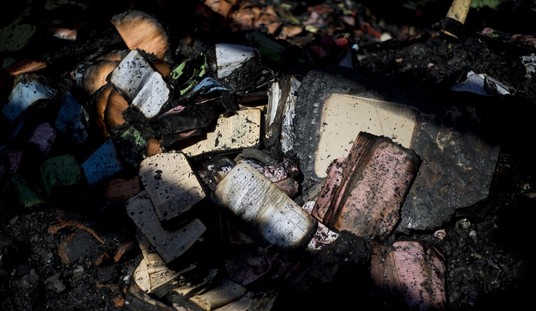“David Brooks: JFK Ruined the Presidency.” At Ricochet, Troy Senik paraphrases David Brooks’ latest column, in which Brooks appears to have some second thoughts about our current president. I’m sure Obama’s (very expensive) trousers are still perfectly creased, however:
It wasn’t Brooks’ primary line of argument that piqued my interest, however. Rather, it was this hypnotic passage, which reads like an afterthought in the context of his broader analysis:
In 1961, John F. Kennedy gave an Inaugural Address that did enormous damage to the country. It defined the modern president as an elevated, heroic leader who issues clarion calls in the manner of Henry V at Agincourt. Ever since that speech, presidents have felt compelled to live up to that grandiose image, and they have done enormous damage to themselves and the nation. That speech gave a generation an unrealistic, immature vision of the power of the presidency.
In the 2006 Commentary article that served as the prototype for James Piereson’s Camelot and the Cultural Revolution, Piereson noted how badly Jackie Kennedy’s posthumous Camelot reference inadvertently damaged the liberal brand in the 1960s:
Significantly, Mrs. Kennedy’s notion of Arthurian heroism derived not from Sir Thomas Mallory’s 15th-century classic Le Morte d’Arthur but from The Once and Future King (1958) by T.H. White (no relation to the journalist), on which the musical was based. White’s telling of the saga pokes fun at the pretensions of knighthood, pointedly criticizes militarism and nationalism, and portrays Arthur as a new kind of hero: an idealistic peacemaker seeking to tame the bellicose passions of his age. This may be one reason why Mrs. Kennedy’s effort to frame her husband’s legacy in this way was widely regarded as a distorted caricature of the real Kennedy and something he himself would have laughed at. Aides and associates reported that they had never heard Kennedy speak either about Camelot the musical or about its theme song. Some of Mrs. Kennedy’s friends said they had never even heard her speak about King Arthur or the play prior to the assassination.
According to Schlesinger, Mrs. Kennedy later thought she may have overdone this theme. Be that as it may, one has to give her credit for quick thinking in the midst of tragedy and grief—and also for injecting a set of ideas into the cultural atmosphere that would have large consequences. For not only did the Camelot reading of heroic public service cut liberalism off from its once-vigorous nationalist impulses but, if one accepted the image of a utopian Kennedy Camelot—and many did—then the best times were now in the past and would not soon be recovered. Life would go on, but America’s future could never match the magical chapter that had been brought to a premature end. Such thinking drew into question the no less canonical liberal assumption of steady historical progress, and compromised the liberal faith in the future.
Without intending to do so, Mrs. Kennedy had put forth an interpretation of her husband’s life and death that undercut mid-century liberalism at its core.
And ever since, liberalism, or what it has since metastasized into, has frequently been an exercise in nostalgia. And why, as Rich Lowry writes, “If Bill Clinton built the bridge to the 21st century, Barack Obama is adamantly refusing to cross it, rendered immobile by his ideology and self-interest.”
Not entirely “unexpectedly,” though.










Join the conversation as a VIP Member